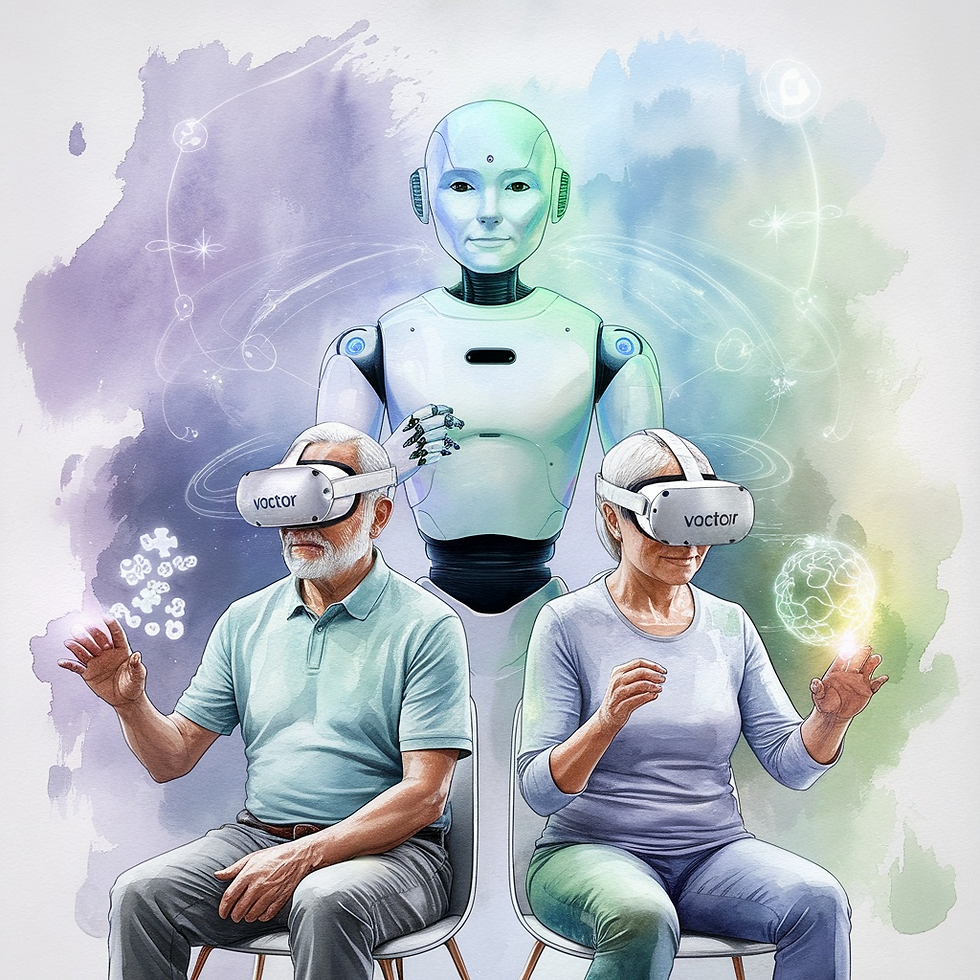.png)
CogniTrack
Alzheimer

Ongoing project
CogniTrack
Alzheimer
We use the power of science for a brighter future, a clearer diagnosis, and a better life. This is not just a technology, it is an investment in human life.


Ongoing project
MCI

Supported
Mild Cognitive Impairment (MCI) refers to age-related mild cognitive decline and is often an early indicator of dementia. However, this process can be slowed down with early intervention and proper rehabilitation. VH-MCI combines virtual reality (VR), artificial intelligence, and cognitive games to offer a scientifically grounded, engaging, and personalized rehabilitation platform.

Rediscover Your Cognitive Power with MCI
Discover Your Cognitive Power
MCI Rehabilitation with Cognitive Games
The assessment process targets the basic cognitive skills that an individual needs in daily life.
Games that increase short- and long-term memory capacity improve your ability to learn and remember information faster.
Maintain mental clarity with interactive tasks specifically designed to increase attention span and strengthen focus skills.
Improve cognitive skills such as problem solving, planning and decision making with dynamic games.
Strengthen your orientation and spatial memory skills with Virtual Navigation (SPA) tasks.
Be more agile in your daily life with games that support quick thinking and decision-making abilities.


Individualized Data Analysis and
Rehabilitation Experience
CogniTrack-MCI offers a personalized data analysis and reporting system that makes users' cognitive rehabilitation process more effective and efficient. After each game session, performance in cognitive areas is analyzed in detail and user-specific feedback is provided.
It identifies your strengths and areas of development by analyzing your cognitive skills in detail.
It provides detailed graphs and regular reports showing performance changes over time.
It supports rehabilitation with personalized games and tasks adapted to the cognitive level of each individual.
It detects performance degradation early and provides proactive intervention recommendations.
In MCI
The Importance of Cognitive Rehabilitation
Mild Cognitive Impairment (MCI) is a critical intermediate stage in the transition to Alzheimer's and other types of dementia, characterized by mild impairments in cognitive functions. However, slowing this process and preserving cognitive health is possible with early intervention and effective rehabilitation. Cognitive rehabilitation;
VR and AI-assisted cognitive exercises slow the progression of MCI by strengthening key skills such as memory, attention, and executive functions.
Daily life scenarios performed in a virtual reality environment help individuals develop problem-solving and planning skills.
The individual's independent living skills are preserved for a longer period of time, and their functionality in daily activities increases.
The rehabilitation process is individualized with tasks customized to the user's cognitive profile.
Interactive game-based tasks keep users engaged and increase treatment participation.

Lack of Early Diagnosis and Inadequate Tools
Dementia is usually advanced by the time symptoms are noticed. Traditional diagnostic methods rely heavily on subjective assessments and clinical observations, making it difficult to detect early symptoms. Furthermore, the lack of standardized tools based on objective biomarkers limits accurate and timely diagnosis. This negatively impacts the quality of life of both individuals and families, leading to missed opportunities for earlier intervention.
Dementia is usually advanced by the time symptoms are noticed. Traditional diagnostic methods rely heavily on subjective assessments and clinical observations, making it difficult to detect early symptoms. Furthermore, the lack of standardized tools based on objective biomarkers limits accurate and timely diagnosis. This negatively impacts the quality of life of both individuals and families, leading to missed opportunities for earlier intervention.
Odaklanma süresi, dikkat dağılmasına karşı direnç ve seçici dikkat becerileri.
Kısa ve uzun süreli bellek kapasitesi ile bilgiyi hatırlama ve işleme yetisi.
Mekânsal algı, yön bulma ve nesneler arası ilişkileri anlama.
Problem çözme, karar verme, planlama ve bilişsel esneklik becerileri.


New Generation Diagnostic Approach with Artificial Intelligence and VR
CogniTrack Dementia combines artificial intelligence and VR technologies to provide an innovative solution that detects early neurobiological signs of dementia. By analyzing eye movements and cognitive processes in real time, the system enables early diagnosis and provides diagnostic support to experts based on objective, scientific data. In this way, the disease process is managed more effectively and treatment plans can be personalized to the individual's needs.
Dementia
The Silent Epidemic of the Modern World
Dementia is a neurological disease that affects millions of people worldwide. As of 2024, 55 million people worldwide are living with dementia, with approximately 10 million new cases diagnosed each year. Alzheimer's disease, the most common form of dementia, accounts for 50% to 70% of all dementia cases. Alzheimer's is a progressive neurological disease that causes memory loss, impaired thinking skills, and loss of independence in daily activities. Studies show that the rate of Alzheimer's in individuals over the age of 65 ranges from 3% to 11%, while it reaches rates as high as 20% to 47% in individuals over the age of 85. In addition, the risk of Alzheimer's doubles every five years after the age of 65.
These diseases, which gradually lead to a decline in cognitive functions, seriously reduce the quality of life of individuals and increase the cost of care. Research shows that early diagnosis and effective care management have the potential to save 1 trillion USD annually. Therefore, innovative solutions for both dementia and Alzheimer's are a great need.
CogniTrack Dementia is a VR-based platform developed for the early diagnosis and management of dementia and Alzheimer's. It offers a fast, non-invasive and user-friendly solution through scientifically validated cognitive tests and games. This platform helps individuals maintain their cognitive health while providing an effective assessment process for physicians. CogniTrack Dementia aims to relieve the burden on individuals and healthcare systems by offering a comprehensive approach to combating Alzheimer's and dementia.












